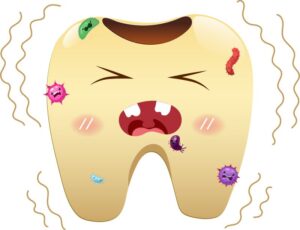
Did you know that there are hundreds of different species of bacteria living in your mouth? Do not let that gross you out too much; most of those bacteria are harmless — some are even essential for your health! Others, though, do pose a risk to your oral health. In fact, there are at least two types of bacteria that play a key role in tooth decay and cavity formation. What are they, and how do they work to attack your teeth? This blog post shares some fascinating information.
The Role of Streptococcus Mutans in Tooth Decay
For many years, scientists have focused their attention on Streptococcus mutans as the primary culprit in the creation of cavities. This bacterial species breaks down sugars, which results in the production of acids that can weaken tooth enamel. S. mutans also attaches itself to the surface of teeth, contributing to the formation of plaque, that sticky biofilm that you strive to remove each time you brush and floss.
While S. mutans is a major culprit in cavity formation, recent studies from 2023 suggest that another bacterial species may also be at work.
The Discovery of Selenomonas Sputigena
Researchers in Philadelphia conducted studies involving plaque samples from 300 children between the ages of 3 and 5, with half of the participants displaying signs of cavities. They conducted further analysis using an additional 116 samples to confirm their initial findings.
Their research indicated that S. mutans often receives assistance from another type of bacteria named Selenomonas sputigena. S. sputigena creates a honeycomb-like structure around S. mutans, thereby offering protection and amplifying acid production. Although S. sputigena does not cause cavities independently, it contributes significantly to the process by supporting the activity of S. mutans.
The Importance of These Findings
Unless you are a science enthusiast, the specific names of bacteria involved in tooth decay may not hold much significance for you. However, this information provides researchers with valuable insight that may lead to more effective strategies for cavity prevention in the future.
In the meantime, you should continue to focus on maintaining good oral hygiene and visit our Bohemia dental team regularly for professional cleanings and examinations. Your good habits can do much to minimize the presence of harmful bacteria in your mouth!
Meet the Practice
Dr. Makadia is an experienced dentist who has helped countless individuals to enjoy improved oral health. Our team loves to interact with patients and create a positive care environment; we love to answer questions and empower our patients to make good decisions about the care of their teeth and gums. To learn more about us or to request an appointment, contact our Bohemia, Long Island, office at 631-567-5566.
